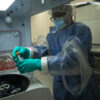With Canada’s COVID-19 inoculation campaign ramping up, scientists at the Ottawa Hospital are looking to join forces with private-sector partners to expand a local facility in the hope of mass-producing a homegrown vaccine.
The hospital announced this week it has signed a deal with Edmonton-based Entos Pharmaceuticals and two other yet-to-be-named producers to manufacture Canadian-developed vaccines for clinical trials.
The work is being done at the Biotherapeutics Manufacturing Centre. The little-known facility located at the Ottawa Hospital’s General campus has been turning out cutting-edge therapies for nearly 15 years, including specially engineered viruses that target and kill cancer cells.
OBJ360 (Sponsored)

uOttawa’s Faculty of Engineering is filling skill gaps in the tech industry
University of Ottawa’s Faculty of Engineering has been preparing for this moment for years, proactively adapting its curriculum to meet the evolving demands of the technology sector and the Ottawa

Bringing France to Ottawa: Chef Yannick Anton recognized for contributions to the capital food scene
At the age of 14 in Nice, France, Yannick Anton was asked to choose a path for his career. After a few cooking classes in school, and seeing his grandfather
Dr. Duncan Stewart, executive vice-president of research at the Ottawa Hospital and a professor of medicine at the University of Ottawa, said the centre’s highly trained staff could play a leading role in meeting the pressing need to accelerate Canada’s vaccine manufacturing capacity.
“We’re unique in that we have the end-to-end (manufacturing) capability,” he says. “We’ve been doing this for many years.”
BMC has already started producing Entos’s single-dose, DNA-based COVID-19 vaccine for phase one of clinical trials. While the centre is equipped with all the state-of-the-art equipment and specialized “clean-room” facilities required for the complex process of manufacturing vaccines, Stewart says it’s currently running at full capacity and has had to turn down projects.
More equipment needed
Now at about 40 employees, the facility is able to turn out enough vaccines for trials like the one with Entos, “but when you get to the multimillions (of doses), we need to expand and get specialized equipment in order to accommodate that number,” he explains.
The facility’s annual budget is in the tens of millions of dollars. It’s funded by a number of government and private contributors, including the Ottawa Hospital Foundation, the Canada Foundation for Innovation, the Ontario Research Fund and BioCan RX, a network of scientists, hospitals and industry partners that conducts research into new cancer therapies.

But Stewart says a bigger investment is necessary in order to produce vaccines, drugs and other therapies on a mass scale, and he’s hoping private industry will get on board.
“Even before COVID, we wanted to do this,” he says. “Now with this additional need, we really do need to expand the facility, so we’re hoping that some of this attention is going to help us get some resources so we can increase the footprint. If there are companies who are interested in partnering with us, that would be great.”
Canada used to have large-scale domestic vaccine manufacturing facilities several decades ago. But those plants have all shut down, and the country now relies largely on foreign producers to supply its needs. Critics say the slow rollout of vaccines in Canada during the COVID-19 crisis illustrates the critical importance of rebuilding that capacity.
Entos and other domestic manufacturers are stepping in to try to fill the void. While they may not be ready to supply vaccines for the current inoculation campaign, scientists say the virus is likely to continue circulating for years to come and made-in-Canada products will go a long way to ensuring the country doesn’t get caught shorthanded in the future.
“I think we’re going to be an integral part of this,” Stewart says.
The senior scientist adds that while other sites in Canada are also producing vaccines for clinical trials, what sets Ottawa’s apart is the skill of its workers.
BMC partners with Algonquin College, the University of Ottawa and non-profit research organization Mitacs to offer students hands-on training in manufacturing vaccines and other biotherapeutics, the only program of its kind in Canada.
Eyeing ‘modest expansion’ soon
“Building the facility is quite straightforward,” Stewart says. “But the facility is just a nice, shiny thing. To make it really work and produce high-quality products, you really need very specialized personnel.”
He’s hoping the facility lands enough additional funding to move ahead on a “modest expansion” within a matter of months. Stewart sees that as a stepping stone to a larger plant focused on commercial manufacturing down the road, adding such a facility would fuel even more groundbreaking healthtech R&D in the capital.
“We’ve got a burgeoning life sciences community,” he says. “We would like to see it (grow) more and we’d like to be more competitive with other sectors. I think having this kind of capacity within Ottawa will help drive that. This is a unique resource that companies will want to be able to access.”





